Winter Star Party 2008
by Michael E. Lockwood
On Tuesday, Jan. 29, 2008, two days before we were to leave for the
Winter Star Party (WSP), it was a balmy 52° in Champaign, IL at
2:30pm. I left work to get a haircut and buy some snacks for the
trip, and as I sat in the barber chair a thunderstorm blew through town
with horizontal rain. The temperature dropped sharply. My
trip to the post office and grocery store involved running from my car
through horizontal rain to get inside. The temperature continued
to drop.
By 8pm that night it was down to 8°, and the wind was howling
outside,
gusting up to 60 mph at the Champaign airport. I longed for
Friday,
the day we were scheduled to arrive in east central Florida to visit
friends
an relatives before the Winter Star Party. I had not been to
Florida
since the 80's, and I was eager to make a return.
On Wednesday, Jan 30, I packed my car full of telescopes and camping
gear and drove an hour south to John Pratte's house in Charleston,
Illinois.
As I pulled out of my driveway, I marked the beginning of a very
long
and overdue journey south. When I arrived we packed John's
full-size
van with telescopes and gear, and settled in for the night. After
throwing in the final items on the morning of the 31st, we headed
south.
Here's a photo of what part of the van looked like as we headed
out.
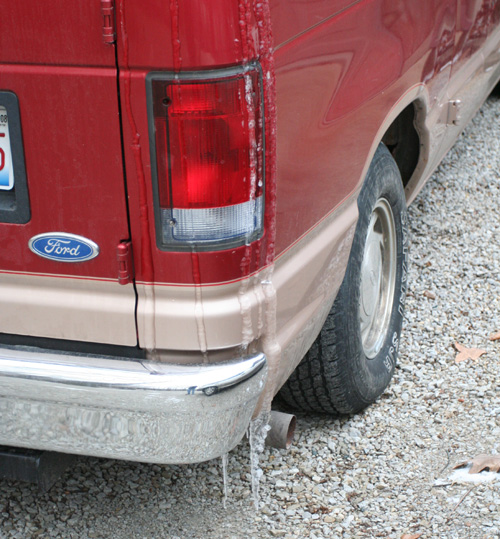
By 11am we were well into southern Illinois, but conversations
overheard in rest areas hinted at the storm that we were staying ahead
of. Winter weather was moving in quickly from the west, and soon
we found ourselves
driving through snow, then sleet as we sped southward. A woman
decided to make a U-turn in the middle of the highway (on purpose) and
we
watched a semi nearly jack-knife in front of us as the driver locked up
the
brakes to avoid the moron. Soon we were mired in a long line of
bumper-to-bumper traffic, the reason for which puzzled us, since we
were in the middle of
nowhere. It was also quite distressing to be in so much
closely-packed
traffic given the windy weather and sleet! As we passed the next
rest
area we discovered the cause - a wide load was so wide it prevented
people
from passing it. Thankfully they pulled off to let us pass.
Finally, somewhere in Kentucky the sleet turned to rain, which
persisted into Tennesee. The wind was gusting and made driving
through places like Nashville and Chattanooga quite fun, but we pushed
on and stopped for dinner north of Atlanta. We went uneventfully
through the city, and continued for another 40 miles, where we stopped
for the night at the hotel where we had reserved rooms.
A good night's sleep gave us a good start on the final leg of the
jouney. We drove through sunny Georgia and stopped for lunch in
north Florida. As we exited the subway and were getting in the
van, we heard a loud CRASH, and the sound of glass breaking. We
looked around and noticed a small motor home had hit the bottom of the
restaurant's sign, and had
broken it. I snapped a picture, but for some reason it didn't
come
out.
We drove on and exited I-75 north of Ocala, leaving some very crazy and
bad (hear that, you @#$@# in the black SUV that nearly wrecked us?!)
drivers behind in exchange for four-lane state roads that should save
us some time..... oh wait, let's sit here for 15 minutes while the crew
lets people going
in the other direction pass by the construction zone... hmmmm... maybe
we
should have taken I-10 over to Jacksonville.... Anyway, we got to
see some of Florida away from the interestate, and we eventually made
it
to my friend's place near the east coast by dinner time. John and
his
wife headed a bit further south to a relative's house.
After a few days of R&R and some observing under reasonably dark
central Florida skies, we spent the night with Pat's relative in Palm
Bay, and got up early and left at 7am on Monday morning. We had
no hope of being in the line of people who vie for the best spot at the
camp, so we took
our time, and stopped for a nice meal at the Cracked Conch Cafe in
Marathon.
Here's some of the scenery along the way - it was just a
beautiful
drive, windows down, heeding the speed limit, and enjoying the sights,
sunshine,
and ocean breeze along the way.
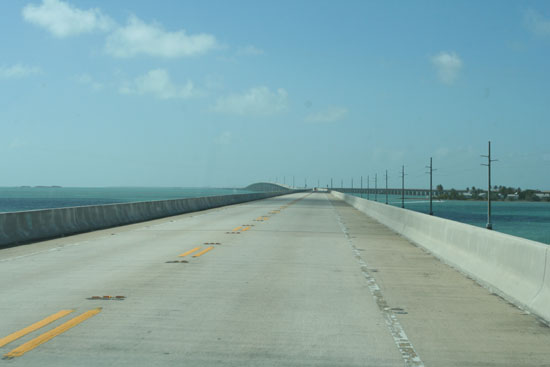
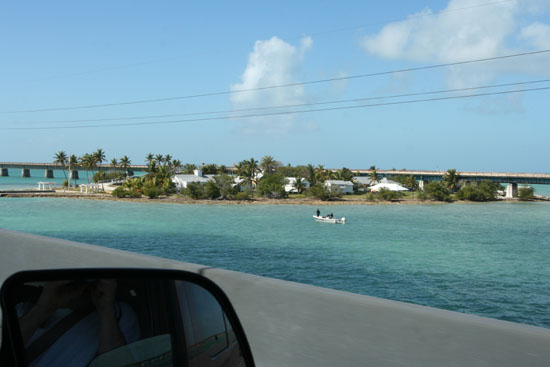
After a nice drive through the keys, we rolled onto West Summerland Key
at about 2pm. We pulled up on the berm, claimed some space, and
luckily found a parking space for the van. I set my tent behind
it, under
a palm tree, but not under the coconuts!
Following Tippy's opening addess (below) we had dinner and collimated
the telescopes. As usual, we set up next to Lou's telescope.
He's from Muncie, Indiana, and we enjoy giving each other grief
while observing. But, since Lou owns a particular brand of
telescope, I will always
give him grief!
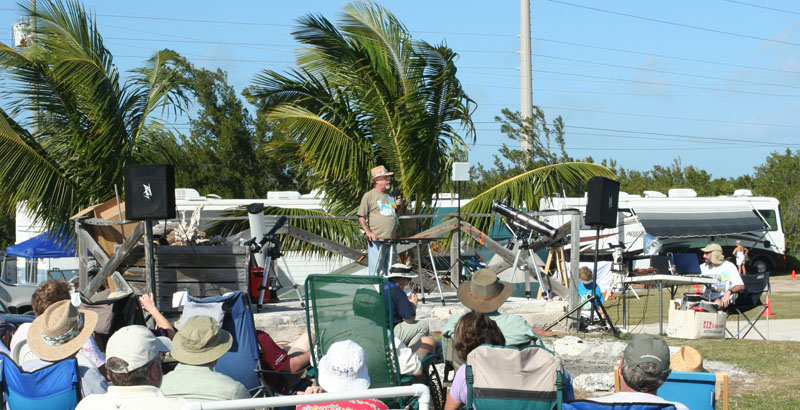
Here are photos of John with his excellent and beautifully built 20"
F/5, and one of the 16" F/4s he is building, in which we used my 16"
F/4 mirror during WSP. Below that is a photo of me with my 12.5"
Cassegrain,
and Jane and Lou with Lou's scope, with palm trees swaying in the
breeze
in the background. It's a rough life.
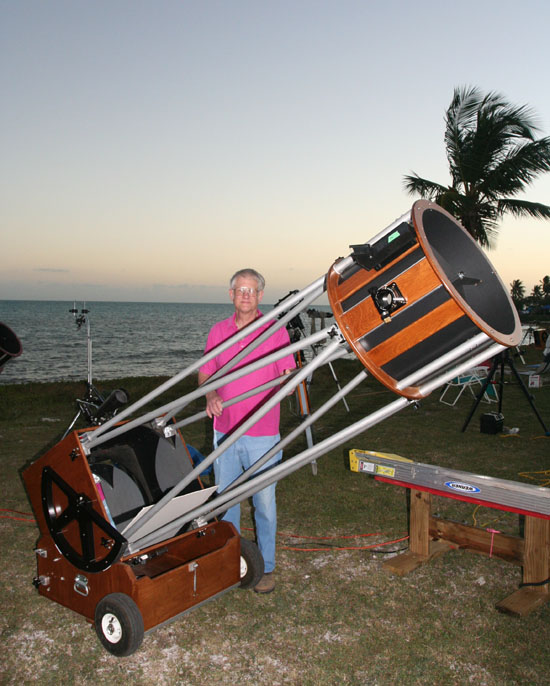
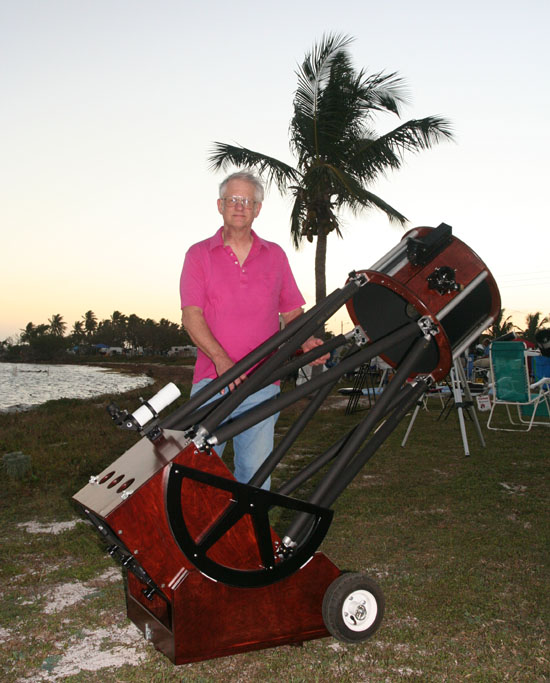
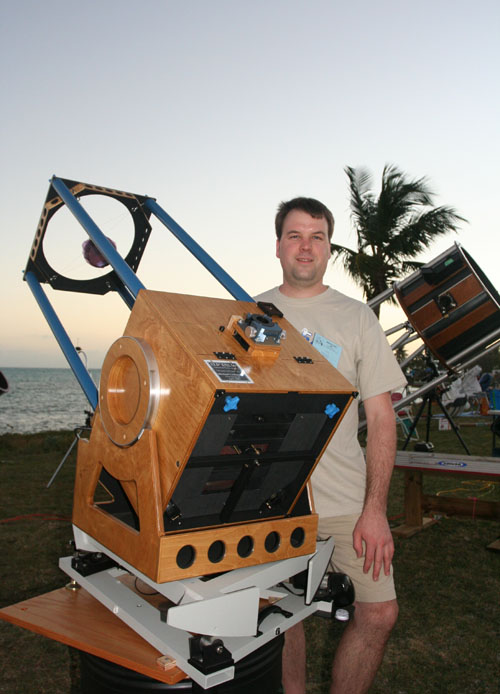
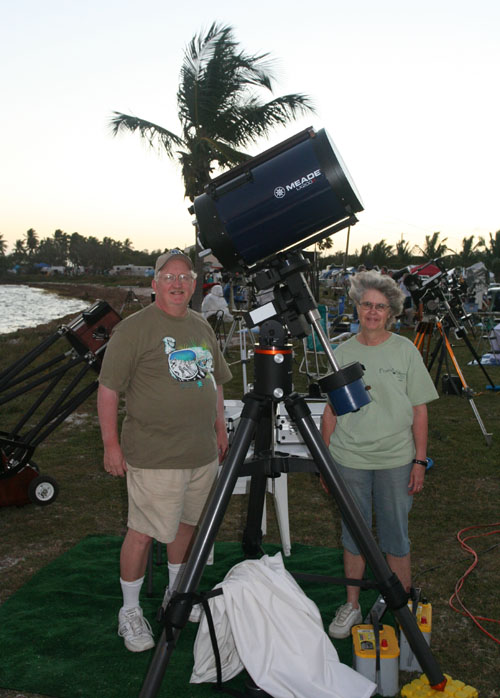
Here is a photo of sunset on the berm, looking east awaiting the first
stars emergence. This was the first observing I had done since
Okie-Tex, due to the foul Illinois weather and scheduling conflicts.
It's only clear when I have something else already planned!
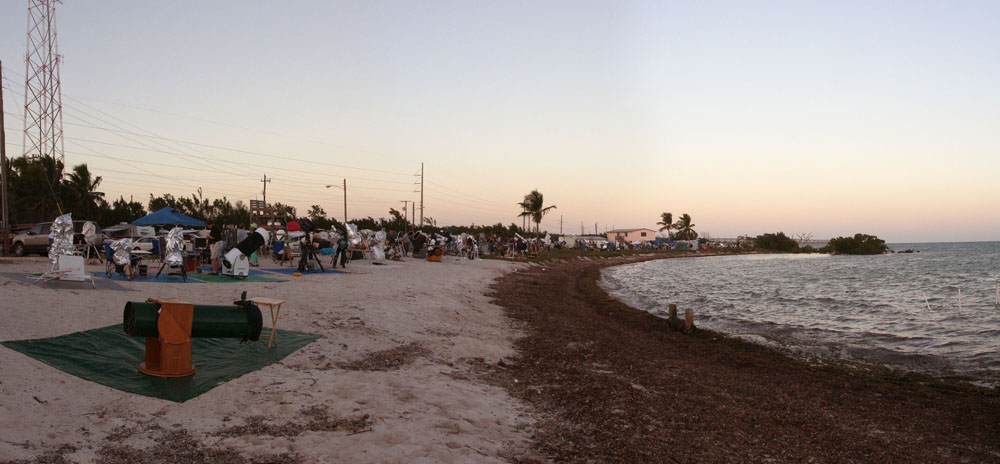
As darkness fell and I collimated my Cassegrain, it became readily
apparent that the make-shift base I was using under my equatorial
platform was not as stable as the base I normally used, which was
temporarily serving as the support for an optical bench in my shop at
the time! The scope was buffetted
by the constant ocean breeze, but we made due. I saw Sirius'
companion
in my Cassegrain when the wind dropped for a few moments, and we also
saw
it more easily in the more stable 16" F/4 and 20" F/5. It was a
distinct
point in all three telescopes when conditions permitted. Scratch
one
observing goal - very easy.
I did not expect the sky to be as dark as it was at West Summerland
key. Overhead and to the south, the sky was quite dark, and I had
the best view of the winter Milky Way that I have seen in recent memory
(I was not up late enough to see it rise at Okie-Tex). My best
readings with a Sky Quality meter were around 21.48, surprisingly good
for a location between Key West and Marathon. The Horsehead,
Rosette, Flame, and M42 were beautiful.
M46 was an unexpected treat with an exquisite planetary suspended
within
the bright cluster. I spent time learning some new constellations
like
Puppis and Vela as they rose, and I reacquainted myself with Centaurus
later
in the night.
I wandered around a bit, and ended up at Vic Menard's 22" scope.
I finally got to look through an Ethos eyepiece at this point.
A local friend has one, but, as I mentioned above, no observing
from October-February had prevented me from looking through it.
At this point a voice in the
dark seemed familiar, similar to a friend who was in Champaign at the
time,
but definitely familiar. It was Atilla Danko, creator of the
clear
sky clock, and I had heard his voice on David Levy's "Lets Talk Stars"
program,
which you can listen to online. We talked while we star-tested
the
16" and 20" scopes we had brought, and I was able to determine that
some 1.25"
adapters, when not inserted all of the way into the paracorr because
more
out-travel is need to reach focus, end up crooked when the setscrew is
tightened,
and this causes astigmatism! Since my 16" F/4 mirror did not
normally
live in this telescope and was slightly short in focal length, we made
the
best of it.
As the night went on John went to rest, but while he was tired, I was
wired, and I wandered the field. The Milky Way sank lower and
lower in the west, until it ringed the horizon. I knew this was
gettting near the time when Eta Carinae (another observing goal) would
be visible, so I looked around for people who wanted to track it down.
In my area on the berm things were fairly quiet, but after a
while I spotted a ~25" telescope pointed nearly at the horizon.
Its owner was looking for Omega Centauri, and soon we had it
centered. It glimmered in the ocean air, but the stars were
points, not blobs. Soon we slewed the scope west and found Eta
Carinae, which looked good even through a bit of haze. At this
point I realized that I better wake John up, so I did and he got to see
Omega and Eta also. (This turned out to be good - on the next two
nights there was more haze and Eta was not as readily visible, and then
we had to leave.)
A cruise ship was making its way westward just south of the keys, so I
got my camera out and got some 30-second exposures of the ship, a faint
glow of
what we thought was Havana, Omega Centauri, the Southern Cross, and Eta
Carinae,
all in the same shop. (I still need to process these.) I
went
to sleep around 3:30am.
I woke up on Tuesday when the tent was too hot to sleep in. Next
time I'll shade it with a tarp, but that was enough sleep for me.
After some
breakfast I felt better, and I sat down and talked to Tom Clark for a
while.
At other points during the star party I also talked to Charlie
Warren,
the new editor of Amateur Astronomy. Charlie was generally busy,
but
I enjoyed talking with him.
I had lunch and got ready for my 1pm talk. I was very pleased to
have been asked to give a talk, and I had the privilege of being
followed by solar observer Greg Piepol, and planetary imaging master
Damian Peach. My talk seemed to go over very well, and I had a
fairly full room. I received a nice WSP T-shirt and an excellent
model of a 6" Clark refractor as a thank-you gift. Then I settled
in for Greg and Damian's talks, which were both excellent and featured
remarkable images of their respective targets. It was interesting
to note their different styles of presentation compared to each other
and mine.
Tuesday night was a bit cloudier, but they came and went. We
observed a bit, talked to people, but went to bed around 1am. I
got a full eight hours of sleep in this night, in my tent, with the
sound of the palm fronds rattling in the breeze above me.
Wednesday was another sunny, breezy day. I chatted briefly with
Markes Ludes, who had not managed to escape his cell phone and laptop
computer. He
was busy using both under the shade tent by the concession stand.
I
didn't bother him for long. I wandered around taking pictures in
the
west part of the camp, and a couple of images from there are included
below.
Truly astronomy paradise, with thatched huts and telescopes set
up
on the beach!
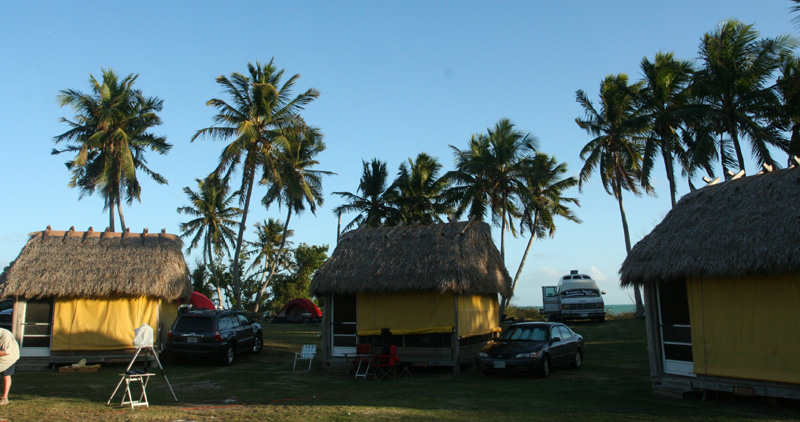
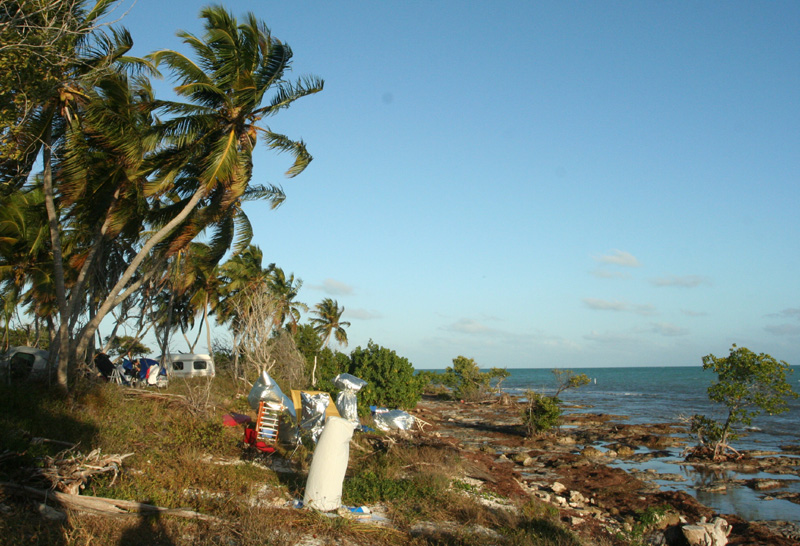
Later in the day I was walking down the berm and I noticed Bob Royce
setting up what appeared to be a 10" Dall-Kirkham. Later in the
evening I said hello, we chatted for a bit, and he and a friend
observed through my Cassegrain. Wednesday night was supposed to
be clearer and less windy, but that forecast did not materialize.
However, after some intermittent clouds it was clearer than
Tuesday night. We moved the 20" F/5 down the berm by the road to
shelter it a bit from the wind.
After talking a bit with Damian Peach, he said he'd stop by and we
could talk about planetary telescopes later in the evening. Being
an optical perfectionist, I considered myself fortunate to have some
time to talk to an expert like Damian. So, I wanted my Cassegrain
to be working as well
as possible when he arrived! I collimated my Cassegrain as
normal, but
then I remembered my issue with the 1.25" adapter that had caused me
problems
in the 16". So, I loosened the setscrew on the collimator and
rotated
it - the laser spot on the secondary moved! I pulled out the
allen
wrenches and fixed the laser collimator alignment in about five
minutes,
and then recollimated the tertiary, secondary, and finally the primary.
Images
showed some improvement, and was pleased to have figured out the source
of
the misalignment. Damian stopped by with Sean Walker from Sky
&
Telescope, and we observed Mars, high overhead, for about 1/2 hr while
discussing
planetary telescopes. As a maker of optics, this was really a
highlight
for me, and I got some ideas for future telescopes. Thanks for
your
time, Damian.
Later on Wednesday I went after my last two observing goals, the Vela
supernova remnant and Centaurus A. I relearned Vela and found a
place to start my search. With a wide-field eyepiece and an OIII
filter in John's 20"
F/5, I soon found ribbons of faint nebulosity running parallel to each
other
in large loops. I studied the area for a while and went over to
Vic's
22" and we looked at it in his scope which had a full tube shroud,
which
helped contrast a bit. Check off another observing goal.
Later on Centarus A was easily found, and that was my final
observing goal. I had seen it before from Hawaii and it is not
hard to find, but I had never found it myself in a telescope until this
night.
As Eta Carinae rose, we rolled the 16" back up the berm for a better
(though hazy) view of Eta Carinae and the Jewel Box cluster near the
Southern Cross. As these settled back into the haze, we settled
into bed and got up the next morning to pack up. We headed east
and north, and we missed Thursday's shuttle launch by a few hours.
All in all, it was a wonderful, warm trip, and I hope to repeat
it for many years to come, especially if I
can mange to get invited to speak again!
Some more photos of the site are included below.


Well, that's about it. I wrote most of this article while
recovering from a cold and then the flu one week and two weeks,
repectively, after returing from Florida. Guess I should have
stayed there.












